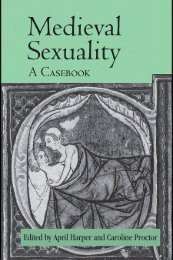Festive Satire: Julian's Misopogon and the New ... - Julian Emperor
Festive Satire: Julian's Misopogon and the New ... - Julian Emperor
Festive Satire: Julian's Misopogon and the New ... - Julian Emperor
Create successful ePaper yourself
Turn your PDF publications into a flip-book with our unique Google optimized e-Paper software.
110 MAUD W. GLEASONto <strong>the</strong> circus.'+" It included a pageant in which men carried, or ra<strong>the</strong>r wore, images of <strong>the</strong>gods. Chrysostom saw Antioch besieged by demons parading in <strong>the</strong> market-place,'+' <strong>and</strong>urged his flock to remain at home when <strong>the</strong>y heard 'tumults, disorders, diabolicalprocessions, <strong>and</strong> <strong>the</strong> agora filled with evil licentious men'.+" And at Ravenna <strong>the</strong> <strong>New</strong>Year's pompa featured satiric impersonations of gods <strong>and</strong> monsters, of beasts <strong>and</strong> women:'They ridicule decency, <strong>the</strong>y violate judicial authority, <strong>the</strong>y laugh at public opinion, ,<strong>the</strong>ymake sport with <strong>the</strong> whole world watching, <strong>and</strong> <strong>the</strong>y say that in so doing <strong>the</strong>y jesC.43One wonders how <strong>Julian</strong> <strong>and</strong> his gods fared in this procession. The situation invitedanapaests. No impartial accounts remain, but when <strong>Julian</strong> berates <strong>the</strong> Antiochenes forabusing him publicly 'in <strong>the</strong> market place', he may be referring to <strong>the</strong> mockery of <strong>the</strong>pompa circensis. He claims that when he criticized <strong>the</strong>ir senators, he attacked <strong>the</strong>m quasiprivately.'But', he objects, 'you abused me in <strong>the</strong> agora, in <strong>the</strong> presence of <strong>the</strong> wholepopulace, with <strong>the</strong> help of those citizens who were capable of composing such charmingwitticisms as yours'.'+'+ The situation he describes presupposes some sort of formalga<strong>the</strong>ring in which both emperor <strong>and</strong> citizens were present in <strong>the</strong> market-place.45At last <strong>the</strong> procession surged into <strong>the</strong> hippodrome. The hippodrome <strong>and</strong> <strong>the</strong> <strong>the</strong>atretraditionally provided <strong>the</strong> people of a Roman city with an opportunity to express <strong>the</strong>iropinions directly to <strong>the</strong>ir rulers. Their shouts might mingle praise <strong>and</strong> blame in variousproportions, <strong>and</strong> Constantine had decreed in 331 that a written record of acclamationsdirected at imperial officials be sent for his perusal to <strong>the</strong> ~apital.4~ Now that <strong>the</strong> emperorwas present in person, <strong>and</strong> in a time of famine <strong>and</strong> religious tension, <strong>the</strong> crowd ga<strong>the</strong>red in<strong>the</strong> hippodrome at Antioch would have been particularly ripe for cathartic expressions ofenthusiasm <strong>and</strong> hostility. On <strong>the</strong>se occasions protocol was important; at <strong>the</strong> <strong>New</strong> Year'sgames of <strong>the</strong> previous year <strong>Julian</strong> had bungled protocol by formally manumitting <strong>the</strong> slavesassembled for that purpose when it was not his prerogative to do so, <strong>and</strong> <strong>the</strong>n fininghimself ten pounds of gold for his mistake.47 Today, consul as well as emperor, he wasexpected to pay for a spectacle he abhorred <strong>and</strong> to remain throughout it <strong>the</strong> Antiochenes'captive audience. He did not stay l0ng.4~ Keyed up for competition <strong>and</strong> looking forward tobaths, banquets <strong>and</strong> dice, <strong>the</strong>y seem not to have restrained <strong>the</strong>mselves; for later in <strong>the</strong>spring we find Libanius apologizing to <strong>Julian</strong>: 'As for <strong>the</strong> audacious behaviour in <strong>the</strong>hippodrome, you mocked that long ago, but we will exact punishment for it; we haven'tstopped searching for <strong>the</strong> scoundrels <strong>and</strong> are not far from arresting <strong>the</strong>m'.'+9 It is possible,but not certain, that <strong>the</strong> 'scoundrels' who led <strong>New</strong> Year's demonstrations against <strong>Julian</strong> hadgained <strong>the</strong>ir experience as members of Antioch's <strong>the</strong>atrical claque, which became notorious40 <strong>Satire</strong> regularly enlivened <strong>the</strong> pompa circensis atRome, where men dressed as Satyrs <strong>and</strong> Sileni'ridiculed <strong>and</strong> mimicked <strong>the</strong> serious movements of <strong>the</strong>o<strong>the</strong>rs, translating <strong>the</strong>m into something ridiculous'(Dion. Hal. ~ II. 72. 1-11).4, Ga~uovov-rrou-rreuaav~wvIri TQS dryop6~ (PG 48.YE;?);cf. --- Dion. Hal. VII. 72. . 17. -4" PG 48. 957.43 This homily of c.430 gives a detailed description of<strong>the</strong> diabolical festivities: 'Ecce veniunt dies. ecceKalendae veniunt, et tota dernonum pompa procedit,idolorum tota producitur officina. . . . FigurantSaturnam, faciunt Jovem, formant Herculem, exponuntcum venantibus suis Dianam, circurnducunt Vulcanurnverbis anhelantern turpitudines suas, et plura quorumquia portenta sunt, nornina sunt tacenda; quorumdeformitates quia natura non habet, creatura nescit,fingere ars laborat. Praeterea vestiuntur homines inpecudes, et in feminas viros vertunt, honestatem rident,violant judicia, censuram publicam rident, illuduntsaeculo teste, et dicunt se facientes ista iocari. Non suntioca, sed sunt crimina' (ffomilia de Pythonibus etMaleficiis, PL 65. 27). Although included among <strong>the</strong>works of Severianus, this homily was actually written byPeter Chrysologus, according to R. Arbesmann, 'The"Cervuli" <strong>and</strong> "Anniculae" in Caesarius of Arles'.Traditio 35 (1979), 112 n. 100. I owe this reference toBill Klingshirn.* <strong>Misopogon</strong> 3 64, cf . 366C.45 The account of Malalas is unfortunately not ofmuch use (Chron. 327-8). He does describe a crowdscene in which people insulted <strong>the</strong> emperor, but subordinateseverything to a jumbled account of <strong>the</strong>martyrdom of Juventinus <strong>and</strong> 'Maximianus'.46 C.Th. I. 16. 6; see C. M. RouechC, JRS 74 (1984),186.47 Ammianus XXII. 7. 2.48 <strong>Misopogon</strong> 340A.49 Or. xv. 75, sent to <strong>Julian</strong> in Persia. ub uQv vaha~K ~ T E ~ B ~ may ~ u ~ be s as close as Libanius could bringhimself to mentioning <strong>the</strong> <strong>Misopogon</strong> (but see Ep. 802,quoted in n. 12 above). My conclusion that Libanius isreferring to <strong>the</strong> <strong>New</strong> Year's races is based on a series ofinferences. He is not referring to <strong>the</strong> shouts of rav~aybuei, -rr&v~a vohhoir that <strong>Julian</strong> mentions in <strong>Misopogon</strong>368C, because that incident took place in <strong>the</strong> <strong>the</strong>atre, at<strong>the</strong> beginning of his stay. <strong>Julian</strong> tells us himself that heattended <strong>the</strong> races very rarely, only on festival days(<strong>Misopogon</strong> 340A), <strong>and</strong> we know that as consul <strong>Julian</strong>had to attend <strong>the</strong> games at <strong>New</strong> Year. Cf. Lib., Or. xv.19 quoted below.













